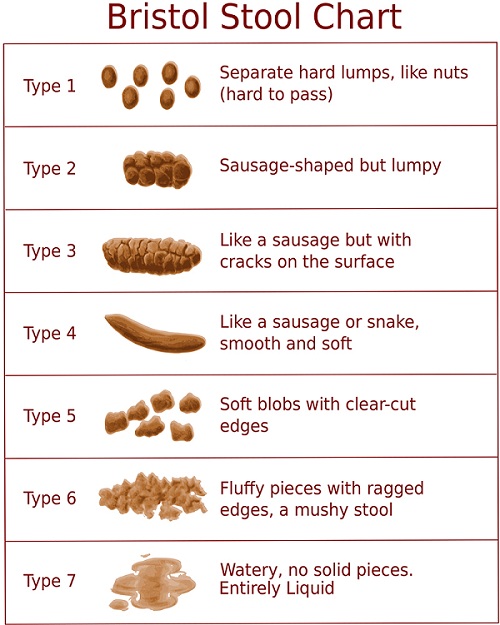"How many times a day should I poop" is not a comfortable topic for many people. However, pooping is a normal part of your body's digestive process. Bowel movements are a vital part of your health. Not only do they excrete unwanted waste from your system, but they tell you a lot about the health of your body and digestive system. Paying attention to your bowel movements can help you catch any ailments or unhealthy habits early.
How Many Times a Day Should I Poop?
On average, once a day is good. One important thing to understand is that everyone is different and therefore there is not a singular answer. You can poop anywhere from three times a day to one time every three days and still be in a healthy range. You should be producing about 1 ounce of poop for every 12 pounds of your body weight each day. When you excrete this is up to your body’s process.
When Is It Considered as Diarrhea?
If your bowel movement is loose, thin, or watery or are you going more than three times a day, then you may have diarrhea. Most of the time, diarrhea is not a huge concern. However, if you have an extreme case, then you may have other symptoms, such as dehydration and dizziness.
You may experience diarrhea that lasts up to two weeks if you have acute diarrhea from an infection. It may last more than a month if you have chronic diarrhea. Infections, medication, Irritable Bowel Syndrome, and your diet are the most common causes of diarrhea.
When Is It Considered as Constipation?
Having bowel movement more than three days apart is constipation. Although it can be quite painful and uncomfortable, it is generally not serious. Not eating enough fiber, not drinking enough water, drinking too much caffeine and alcohol, having an infection, mental illnesses, and certain foods may cause you to have constipation.
What Should My Poop Look Like?
The Bristol Stool Chart (shown below) has been created for use in medical facilities. You can use this chart to become more informed of your health as well.

Type 1 and 2
Little pellets or lumpy sausages which are hard to push out indicate that you have constipation. It can become painful and very uncomfortable. You need to visit your doctor for an accurate diagnosis if it does not go back to normal within a week.
Type 3 and 4
If it looks like sausage with cracks or a smooth snake, then you are great. These are what most people are aiming for when they want to have "normal" bowel movements.
Type 5, 6 and 7
Small blobs, fluffy pieces, and watery stools are considered diarrhea. If your bowel movements do not go back to types 3 and 4 within a couple of days, you need to visit your doctor.
What About the Color?
The color of your poop is not a 100 % indicator of your health as it varies as much as the answer to “how many times a day should I poop”. However, it can be something for concern. Here are a few color codes you can use to determine what the color of your poop means:
Red: If it’s dark or bloody red, it could indicate that you have hemorrhoids or cancer; you should schedule an appointment with your doctor. On the other hand, you may have eaten red beets or popsicles in the last 40 hours. A reddish purple may simply indicate that you have eating foods that are red or purple in color.
Dark Brown: Are you taking iron supplements?
Tar Black: You may have a GI bleed or are taking medications that turn your stools a different color.
Clay Colored: You might have a biliary system issue.
Yellowish Brown: Commonly known as "normal".
Jumping to conclusions about the color of your poop is not a good idea. If it is an abnormal color for you, think about what you have eaten or drank over the past 48 hours. If you still cannot figure it out, schedule an appointment with your doctor.
How to Maintain Normal Poop
Since you've got the answer to "how many times a day should I poop", you want to learn further about how to maintain digestive health and have normal poop every day. Here are some tips:
1. Consume More Fiber
The goal is to consume about 25 grams of fiber each day for women, and 38 grams for men. Eating whole foods such as whole grains, legumes, fruits, and vegetables are the best ways to get your needed fiber.
2. Drink Plenty of Water
Water helps keep you hydrated. When you are hydrated, you will have healthier poop. Also, you need water to help absorb and move the fiber you consume. Drinking 8 ounces eight times a day is best.
3. Take Probiotics
Probiotics help your digestive system in many ways by creating more of the good bacteria in your gut. Kefir, kombucha, sauerkraut, kimchi, and yogurts are great ways to add probiotics to your diet.
4. Try Supplement with Magnesium
Magnesium will help you soften your poop, naturally by adding water to your poop from your gut.
5. Pay Attention to Your Liver
Your liver plays a large role in creating bile so that you can digest fats and expel the toxins in your body. If you are not able to properly digest fats, the fats may pile up in your intestines and cause constipation.
6. Be Active
Exercise is great for keeping you on a regular schedule for pooping. The movement helps push the excrement through your digestive system. Moreover, it can reduce your stress levels and ease the tension in your digestive tract.
